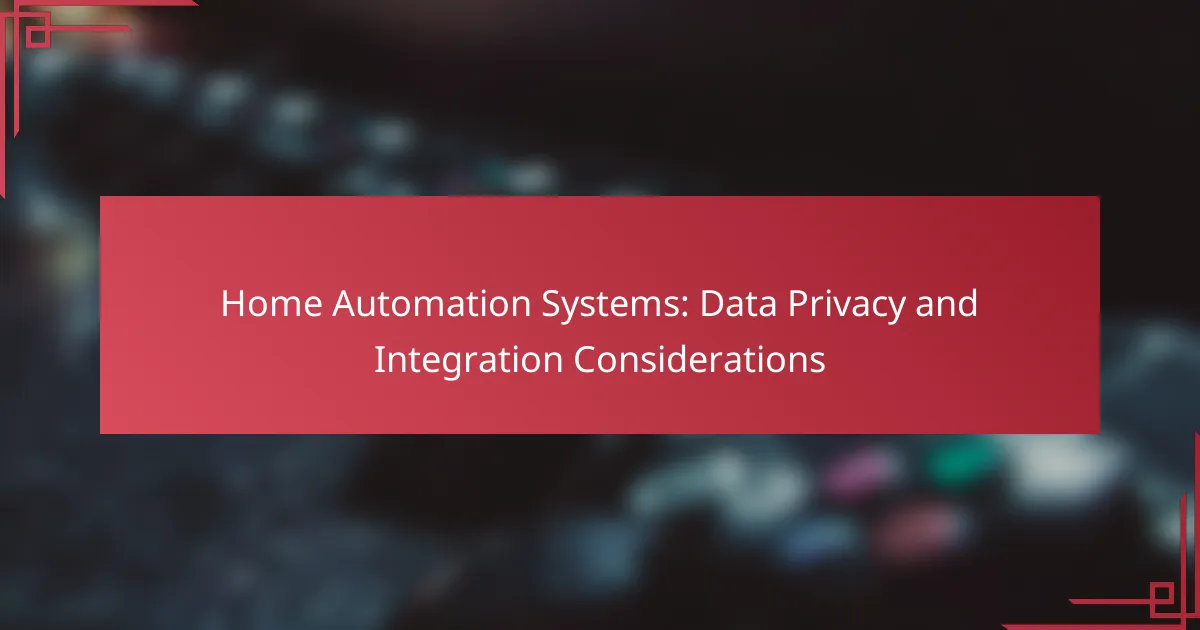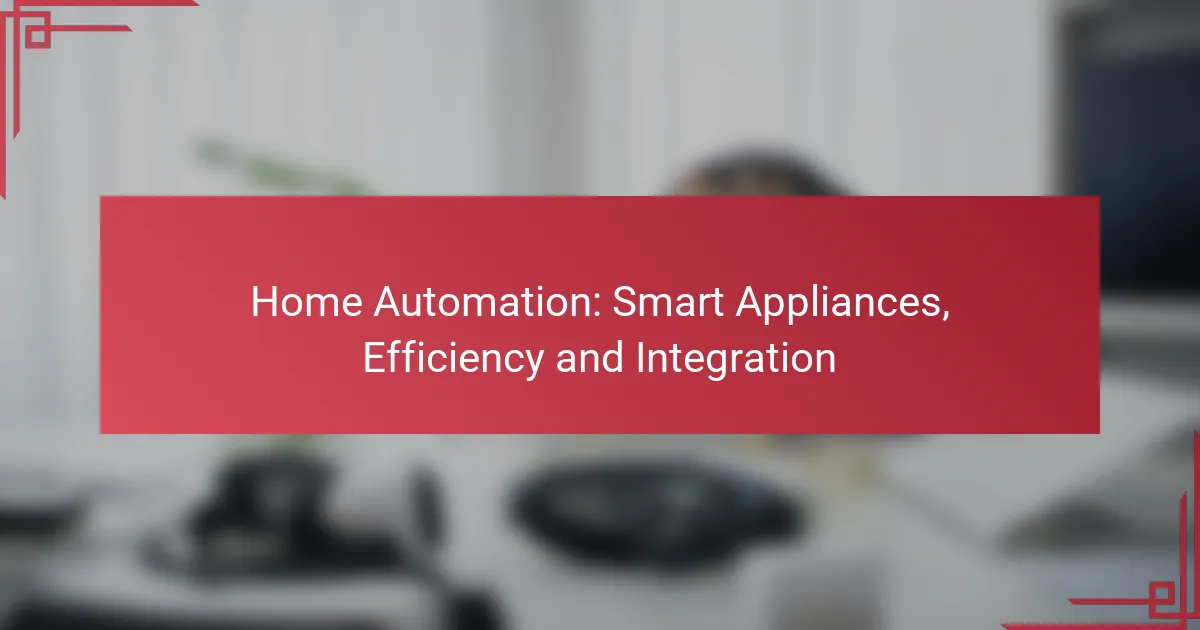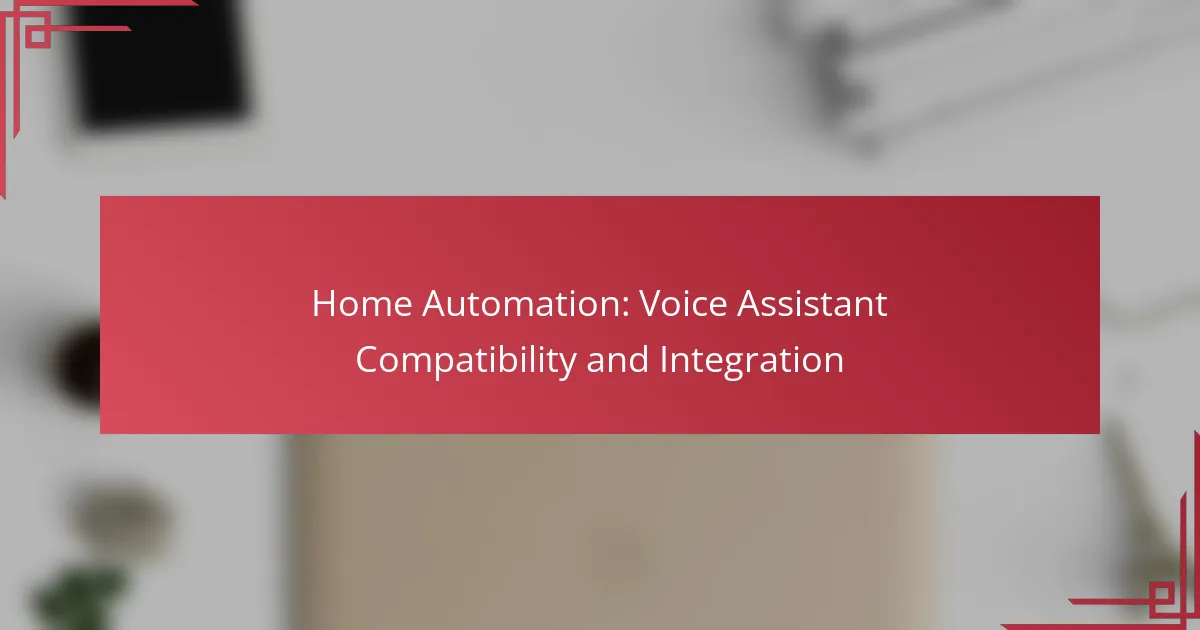As home automation systems become increasingly popular, prioritizing data privacy is essential for users seeking to protect their personal information. Leading platforms like Google Nest Secure, Amazon Echo Plus, Apple HomeKit, and Samsung SmartThings offer various privacy controls and integration capabilities, allowing for a tailored smart home experience. Ensuring compatibility with existing devices and understanding cloud service dependencies are crucial for seamless operation and enhanced user satisfaction.
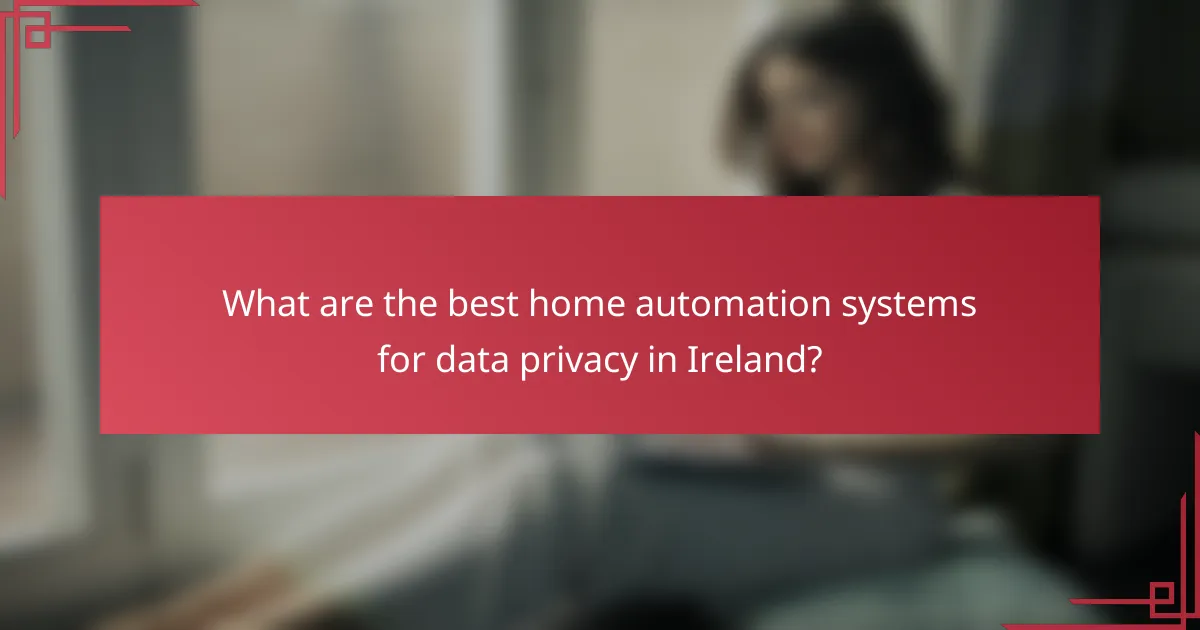
What are the best home automation systems for data privacy in Ireland?
The best home automation systems for data privacy in Ireland prioritize user data protection and offer robust security features. Systems like Google Nest Secure, Amazon Echo Plus, Apple HomeKit, and Samsung SmartThings provide varying levels of privacy controls and integration options.
Google Nest Secure
Google Nest Secure is designed with user privacy in mind, featuring end-to-end encryption for data transmission. It allows users to manage privacy settings easily through the Google Home app, enabling control over what data is shared.
Consider the integration capabilities with other Google services, which can enhance functionality but may raise privacy concerns. Users should regularly review their privacy settings to ensure they align with personal preferences.
Amazon Echo Plus
Amazon Echo Plus offers a range of smart home integrations while providing options for data privacy management. Users can disable the microphone and camera, ensuring that personal conversations remain private.
However, it’s essential to be aware of Amazon’s data collection practices. Users should familiarize themselves with the privacy settings available in the Alexa app to limit data sharing and manage voice recordings effectively.
Apple HomeKit
Apple HomeKit is known for its strong focus on privacy, employing end-to-end encryption for all data. Users can control their smart devices through the Home app, with a clear emphasis on user consent and data ownership.
HomeKit’s compatibility with a wide range of devices allows for seamless integration while maintaining privacy standards. Users should take advantage of the privacy features, such as two-factor authentication, to enhance security further.
Samsung SmartThings
Samsung SmartThings provides a flexible platform for home automation, with various privacy controls available. Users can customize their privacy settings to limit data access and sharing with third-party applications.
While SmartThings supports a broad ecosystem of devices, users should be cautious about the permissions granted to each device. Regularly reviewing and adjusting privacy settings can help maintain control over personal data.
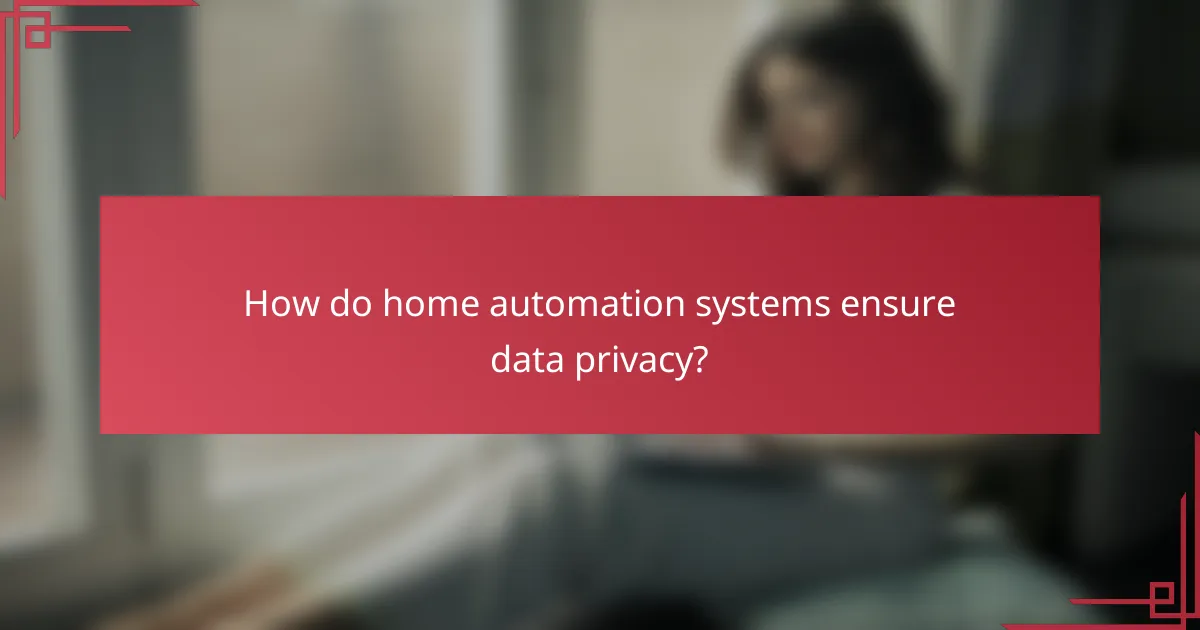
How do home automation systems ensure data privacy?
Home automation systems prioritize data privacy through various security measures that protect user information from unauthorized access. Key strategies include encryption, data anonymization, and regular software updates to safeguard sensitive data.
End-to-end encryption
End-to-end encryption ensures that data transmitted between devices in a home automation system is secure and unreadable by anyone except the intended recipient. This means that even if data is intercepted, it remains protected and cannot be deciphered without the appropriate decryption keys.
For practical implementation, look for systems that utilize strong encryption protocols such as AES (Advanced Encryption Standard) with 256-bit keys. This level of encryption is considered highly secure and is widely adopted in the industry.
User data anonymization
User data anonymization involves removing personally identifiable information from data sets, making it impossible to trace back to individual users. This practice is crucial for protecting user privacy, especially when data is shared with third parties for analytics or service improvements.
When evaluating home automation systems, check if they have policies in place for anonymizing data. Systems that aggregate data without personal identifiers can significantly reduce privacy risks while still providing valuable insights.
Regular software updates
Regular software updates are essential for maintaining the security of home automation systems. These updates often include patches for vulnerabilities that could be exploited by hackers, ensuring that the system remains resilient against emerging threats.
Users should enable automatic updates whenever possible and regularly check for updates manually if automatic options are not available. Staying current with software updates can dramatically lower the risk of data breaches and enhance overall system security.
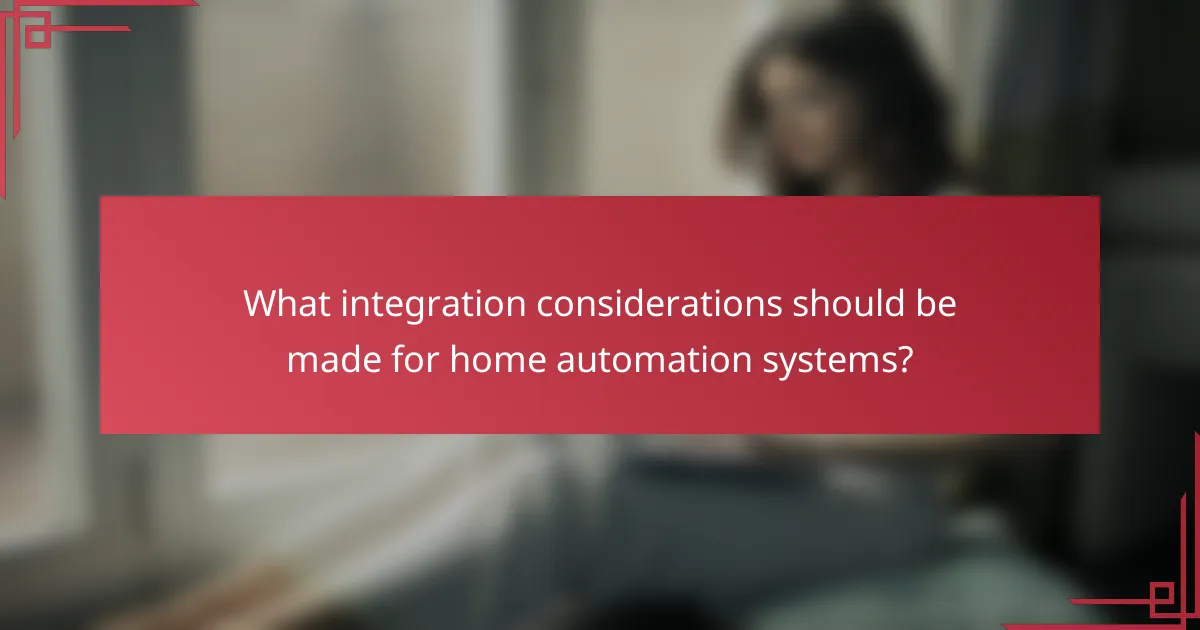
What integration considerations should be made for home automation systems?
When implementing home automation systems, key integration considerations include compatibility with existing devices, adherence to interoperability standards, and understanding cloud service dependencies. These factors ensure seamless operation and enhance the overall user experience.
Compatibility with existing devices
Compatibility with existing devices is crucial for a successful home automation setup. Before purchasing new components, verify that they can connect with your current devices, such as smart lights, thermostats, and security systems. Look for systems that support widely used protocols like Zigbee or Z-Wave to maximize compatibility.
Additionally, consider the age and technology of your existing devices. Older systems may require adapters or may not integrate at all, leading to increased costs and complexity. Always check manufacturer specifications and user reviews to gauge compatibility.
Interoperability standards
Interoperability standards dictate how different devices communicate within a home automation ecosystem. Adopting systems that comply with established standards, such as Matter or Wi-Fi Alliance certifications, can significantly enhance device compatibility and functionality. These standards help ensure that devices from different manufacturers can work together seamlessly.
When selecting devices, prioritize those that support these interoperability standards. This approach not only simplifies integration but also future-proofs your home automation system against rapid technological changes.
Cloud service dependencies
Many home automation systems rely on cloud services for functionality, data storage, and remote access. Understanding these dependencies is essential, as they can affect system performance and reliability. Evaluate the service level agreements (SLAs) of cloud providers to ensure they meet your needs for uptime and data security.
Be aware that relying heavily on cloud services may introduce latency and require a stable internet connection. Consider hybrid systems that allow local control to mitigate potential disruptions caused by internet outages or service interruptions.
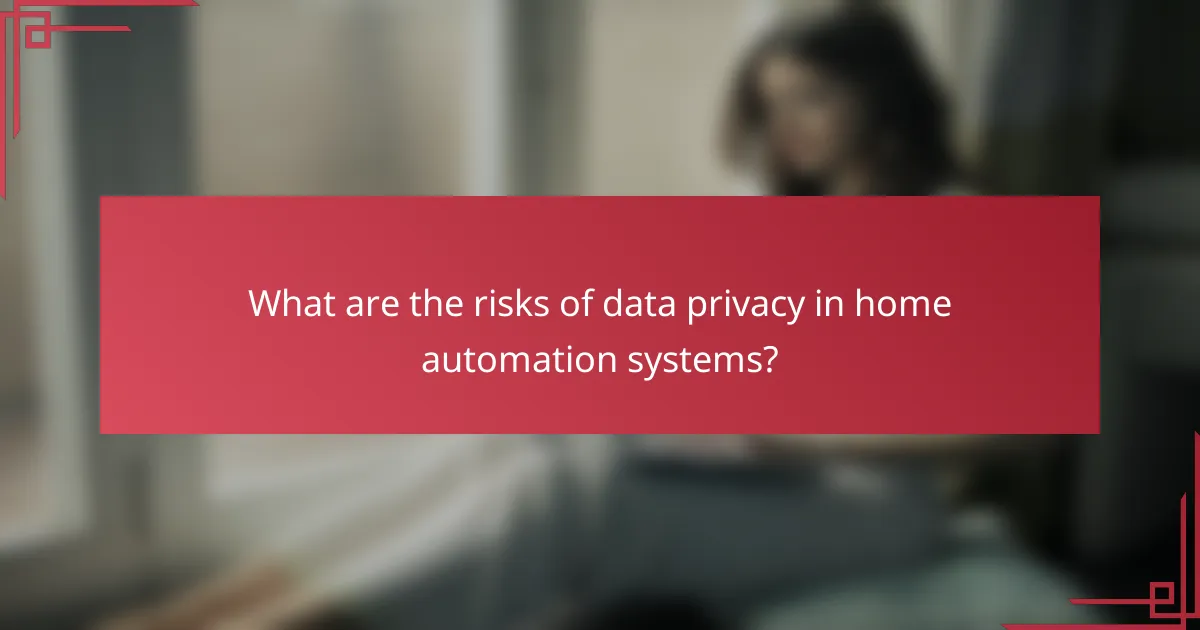
What are the risks of data privacy in home automation systems?
Home automation systems can pose significant data privacy risks, primarily due to their reliance on interconnected devices and cloud services. These risks include unauthorized access, data breaches, and the use of insecure devices, all of which can compromise personal information and security.
Unauthorized access
Unauthorized access occurs when individuals gain control over home automation systems without permission. This can happen through weak passwords, unpatched software vulnerabilities, or phishing attacks targeting users. To mitigate this risk, users should implement strong, unique passwords and enable two-factor authentication wherever possible.
Regularly updating device firmware and software can also help close security gaps that attackers might exploit. Users should be aware of the devices connected to their home network and regularly review access permissions to ensure only trusted devices are connected.
Data breaches
Data breaches in home automation systems can lead to the exposure of sensitive personal information, such as usage patterns, schedules, and even video feeds. These breaches often result from inadequate security measures by manufacturers or third-party service providers. Consumers should choose devices from reputable brands that prioritize data protection and comply with relevant regulations.
To further protect against data breaches, users should consider using a virtual private network (VPN) for their home network, which can encrypt data and obscure their online activities from potential attackers. Regularly monitoring accounts for unusual activity can also help identify potential breaches early.
Insecure devices
Insecure devices are those that lack robust security features, making them vulnerable to attacks. Many smart home devices are designed with convenience in mind, often at the expense of security. Users should research devices before purchasing, looking for those that offer strong encryption, regular updates, and security certifications.
Additionally, it is advisable to segment smart home devices on a separate network from personal computers and smartphones. This can help contain any potential breaches and limit access to sensitive information. Users should also disable features such as remote access if they are not needed, reducing the attack surface for potential intruders.
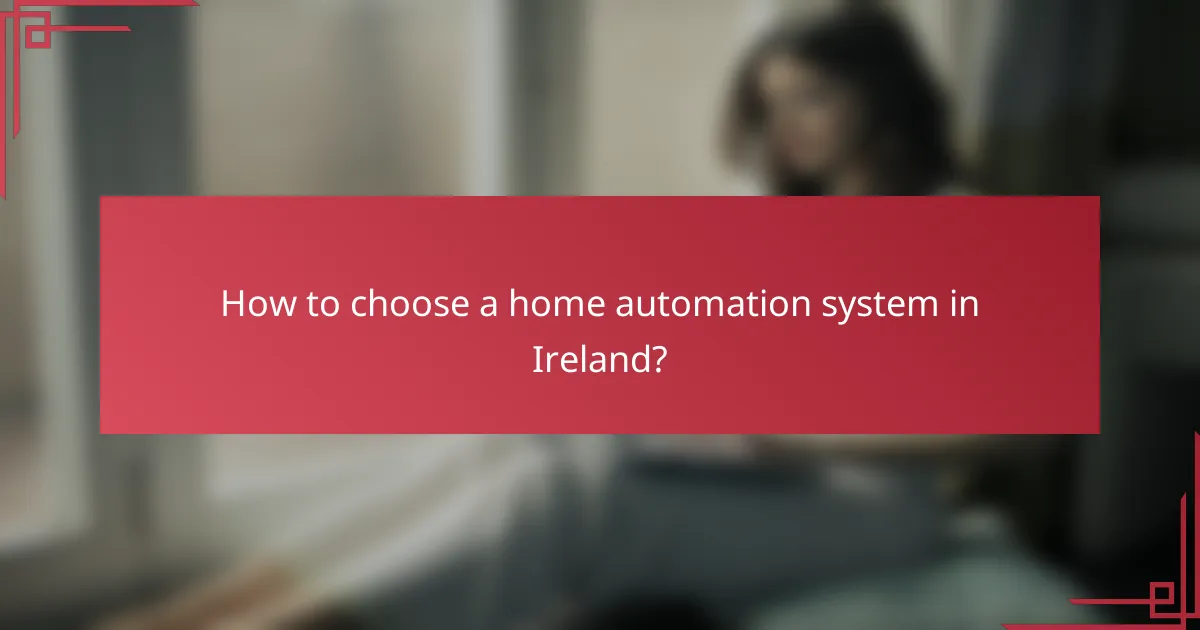
How to choose a home automation system in Ireland?
Choosing a home automation system in Ireland involves evaluating privacy policies, assessing integration capabilities, and considering user reviews. These factors will help ensure that the system meets your needs while protecting your personal data.
Evaluate privacy policies
When selecting a home automation system, carefully review the privacy policies of potential providers. Look for clear information on how your data will be collected, stored, and shared.
Ensure the system complies with the General Data Protection Regulation (GDPR), which governs data protection in Ireland. This regulation mandates transparency and user consent regarding personal data usage.
Assess integration capabilities
Integration capabilities are crucial for a seamless home automation experience. Check if the system can connect with existing devices, such as smart speakers, security cameras, and thermostats.
Consider systems that support popular protocols like Zigbee or Z-Wave, as these can enhance compatibility with a wide range of devices. A versatile system will allow you to expand your automation setup without major hurdles.
Consider user reviews
User reviews provide valuable insights into the performance and reliability of home automation systems. Look for feedback on ease of use, customer support, and any recurring issues.
Platforms like Trustpilot or local tech forums can be helpful in gathering opinions from other users in Ireland. Aim for systems with consistently positive reviews to increase the likelihood of a satisfactory experience.
